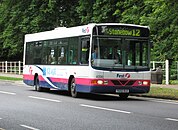Wright Crusader
| Wright Crusader | |
|---|---|
 | |
| Overview | |
| Manufacturer | Wrightbus |
| Production | 1995-2002 |
| Assembly | Ballymena, Northern Ireland |
| Designer | Trevor Erskine |
| Body and chassis | |
| Doors | 1 or 2 |
| Floor type | Low floor |
| Chassis |
|
| Related | Wright Pathfinder |
| Powertrain | |
| Engine | Cummins B Series (Dennis Dart SLF) Volvo (Volvo B6LE/Volvo B6BLE) |
| Capacity | 51-63 passengers |
| Dimensions | |
| Length | 9.4–10.8 metres (31–35 ft) |
| Width | 2.4 metres (7 ft 10 in)[1] |
| Height | 2.95 metres (9 ft 8 in)[2] |
| Chronology | |
| Predecessor | Wright Handybus |
| Successor | Wright Cadet |
The Wright Crusader was a single-deck midibus body built on Dennis Dart SLF, Volvo B6LE and Volvo B6BLE chassis by Wrightbus between 1995 and 2002.
First generation (1995–2000)[edit]

The Wright Crusader was first introduced on the 10.6 metres (35 ft) Volvo B6LE chassis in 1995, intended to replace the step-entrance Volvo B6 and Dennis Dart-based Wright Handybus. The first generation Crusader shared design characteristics from other Wright products of the time, being built with a Alusuisse bolted aluminium frame and bonded window glazing, and the interior could be configured to carry 54 passengers, including wheelchair users. The 325 millimetres (12.8 in) low entrance step was capable of being lowered to 235 millimetres (9.3 in) at the kerbside via the 'kneeling' function of the chassis, and a shallow ramp from the entrance door to the passenger compartment was present on Crusader bodied B6LEs to accommodate for the front axle while remaining compliant with the recommendations of the Disabled Persons Transport Advisory Committee (DiPTAC) on improving wheelchair and pushchair access.[2]
The Crusader body would later be launched on the Dennis Dart SLF chassis in June 1996, available in lengths of 9.4 metres (31 ft), 10.2 metres (33 ft) and 10.8 metres (35 ft) to compete with other midibuses entering the low-floor market. Compared to the Volvo B6LE-based Crusader, this variant could carry a total of 51 to 63 passengers depending on length, and was built with a flat floor and 'kneeling' suspension as standard; the only steps in the interior were two that led to raised seats situated on raised rear wheel arches. Notably, the Crusader bodied Dart SLF was the first low-floor Wright body to feature rubber gasket windows, made possible due to the improved rigidity of the Dart SLF chassis.[1]
Following the construction of one prototype and a demonstrator, the first ten production Crusaders, on B6LE chassis, were delivered to Mainline Buses in October 1995, with two of the ten being delivered in early 1996 for Humberside County Council contracted services in Goole.[3] Eight Dennis Dart SLF Crusaders were also delivered to London United in September 1996.[4]
Of the 425 first generation Crusaders produced, 154 were on Dennis Dart SLF chassis and 272 on Volvo B6LE chassis. Travel West Midlands purchased 149 B6LEs, 23 of which went to subsidiary Travel Merry Hill,[5][6] and GM Buses North purchased 46 Crusaders on the B6LE chassis. The only export order for the first-generation Crusader was to ACTION of Canberra, Australia, who purchased 25 Crusaders on the Dart SLF chassis in 1997.[7][8]
Second generation (1999–2002)[edit]
This section relies largely or entirely upon a single source. (July 2023) |
The second generation Crusader, known as the Crusader 2, was introduced in 1999 and built exclusively on the Volvo B6BLE chassis, the successor to the B6LE. In contrast to early first generation Crusaders, all Crusader 2s have shallower windows with a deeper panel above, bringing them in line with other Wrightbus designs like the Endurance and Pathfinder; some of the later built first generation Crusaders shared this characteristic however, making the two designs indistinguishable except for the different chassis.
The first Crusaders 2s were delivered to Mainline in April 1999; the delivery included one rebodied B6LE with prototype Crusader 2 bodywork, as well as nine newly built Crusader 2s. Of the 267 Crusader 2s produced, FirstGroup purchased 86, Arriva 61 and Dublin Bus 52.[9]
Gallery[edit]
-
Wright Crusader 2 bodied Volvo B6BLE
-
Wright Crusader bodied Dennis Dart SLF rear
References[edit]
- ^ a b Morgan, Mike (29 June 1996). "A Wright Crusader". Coach & Bus Week. No. 224. Peterborough: Emap. p. 8. Retrieved 1 June 2024.
- ^ a b Jones, Stuart (14 April 1995). "Wright Crusader Volvo B6LE: The passenger accessible bus becomes more operator accessible". Bus & Coach Buyer. No. 302. Spalding. pp. 39–41. Retrieved 1 June 2024.
- ^ "Easiaccess Crusaders". Bus & Coach Buyer. No. 342. Spalding. 26 January 1996. p. 23.
- ^ "Fleet Additions". Bus & Coach Buyer. No. 404. Spalding: Glen-Holland Ltd. 11 April 1997. p. 48.
- ^ Williams, Mark (16 October 1997). "TWM: orders for over 200 lowfloors". Coach & Bus Week. No. 291. Peterborough: Emap. p. 14. Retrieved 1 June 2024.
- ^ Jarosz, Andrew (8 January 1998). "TWM orders over 100 more lowfloors". Coach & Bus Week. No. 302. Peterborough: Emap. pp. 4–5. Retrieved 1 June 2024.
- ^ "Crusaders for Australia". Bus & Coach Buyer. No. 402. Spalding: Glen-Holland Limited. 28 March 1997.
- ^ "Wright Buses for Canberra". Bus & Coach Buyer. No. 403. Spalding: Glen-Holland Limited. 4 April 1997. p. 2.
Further to last week's story about the order from Action Bus of Canberra, Australia for Wright Crusader low floor midibuses on Dennis Dart SLF chassis, Wright's has informed us that the current order is for 25 buses worth £1.5 million.
- ^ Wright Crusader 2 Bus Lists on the Web
External links[edit]
![]() Media related to Wright Crusader at Wikimedia Commons
Media related to Wright Crusader at Wikimedia Commons
![]() Buses portal
Buses portal


